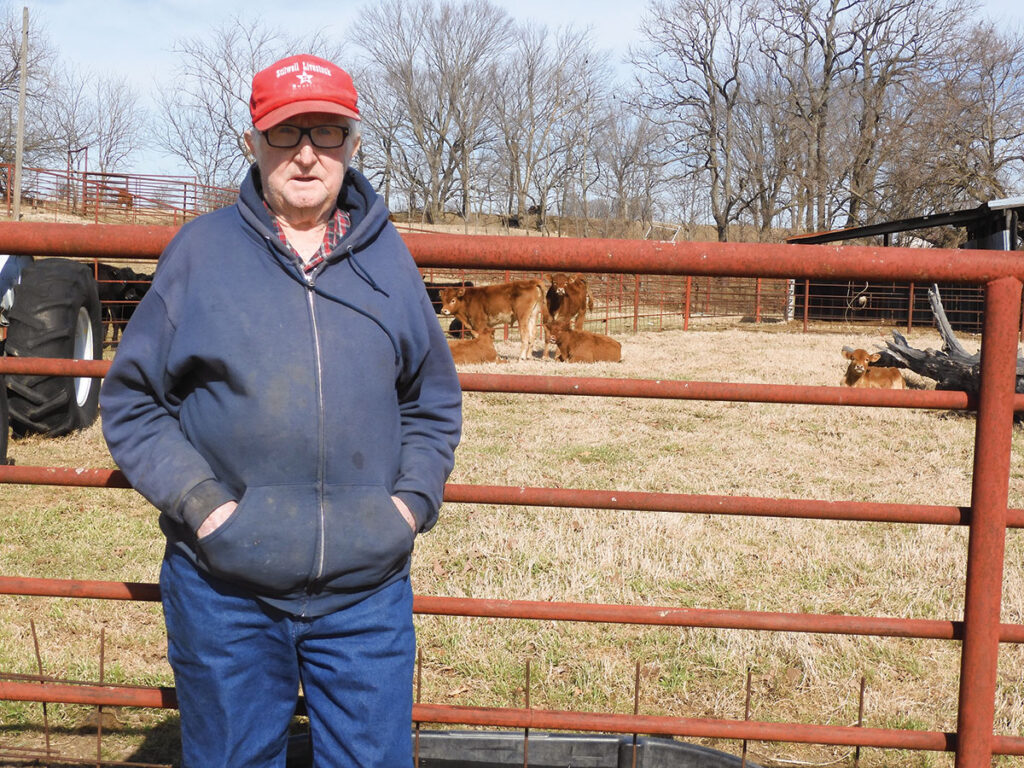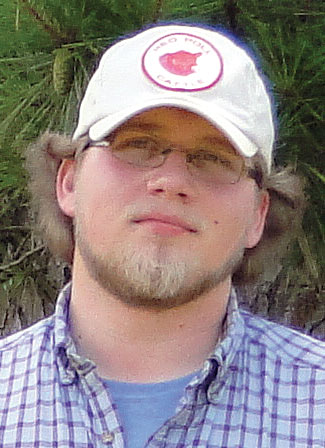
As Kenneth Doyle approached his retirement from veterinary medicine, he decided to purchase and feed lightweight cattle to about 450 pounds. Photo by Terry Ropp.
Kenneth Doyle looked to his past as he approached retirement
OAKS, OKLAHOMA – Kenneth Doyle is an 81-year-old retired veterinarian who always considered clients as friends because he believes without friendship there is no business.
“By the time you reach my stage in life, I realize how deeply grateful I am for all of my Northwest Arkansas friends,” Kenneth said. “Their friendship, patronage and help were invaluable in my reaching a retirement where I can raise my cattle far longer than most would even consider. I spend so much time with them I call it mildewing because I can almost see the mildew grow.” He grew up on a cattle/hog farm in Stilwell, Okla., and was around animals since he was 10 years old. The animals really caught the boy’s interest because when his father had a sick animal, he always told Kenneth if he could save it and take care of it, he could have it.
After graduating from high school, Kenneth tried college, twice; first at Northeast Oklahoma State University in Tahlequah. Okla., and later in Miami, Okla., but quit both times because he wasn’t willing to disrupt his farming life. Then, in 1963, he was drafted and spent two years in the Army in the Signal Corps in Germany. While there, he decided he wanted to be a veterinarian – regardless of what he had to give up to achieve that goal. He graduated from veterinary school from Oklahoma State in 1972 using the G.I. Bill. At one point during a school break, he worked for a Fayetteville veterinary clinic run by veterinarians Doyne Hamm and John Ashburn. They asked him to return and work for them when he finished school. He did so and four months later was offered a partnership in the large and small animal practice.
Kenneth began as a mobile veterinarian and then worked both on-site and in-house until he retired. He also worked two days a week at the Washington County and Springdale sale barns as a veterinarian, but mostly as a representative to make sure all federal travel regulations were followed.
A favorite veterinary memory is a mother with a young boy about 8-years-old coming to the clinic on a Sunday morning when he was doing the clinic’s chores. He was alone and faced a frantic young mother and her son who was crying relentlessly. She explained her son didn’t have a pet dog but had a pet chicken pointing to a squirming chicken whose tongue was hanging out the bottom of its jaw. The mother pleaded with Kenneth to help the chicken because her son was so distressed. Amidst the boy’s wails, Kenneth tried twice to replace the tongue and tie the suture, but the chicken kept jerking its head, causing the tongue to fall out again. Kenneth explained to mother she would have to help. She held the chicken’s head and tongue so he could secure the suture. He told the screaming child he could be quiet because the chicken was going to be OK. The immediate silence was like a faucet being turned off. When the mother asked Kenneth what he was going to charge, Kenneth maintains that sentiment got the best of him when he found out the boy had his own money to pay for the vet bill. He said he would charge $1. The boy then plopped a $20 bill on the counter, and Kenneth gave him $19 in change because it was the right thing to do even if it really didn’t cover the services.
Another favorite veterinary but non-agricultural memory is about a really large animal. One day a circus called and wanted him to come to the Washington County Fairgrounds where he discovered they had a 6- to 7-ton male elephant that needed surgery because the female behind him in the two elephant trailer had grabbed his tail and pulled it so hard it stripped the flesh with the tail needing to be amputated. Kenneth vehemently explained he had no idea how to tranquilize an elephant. Not to be deterred, the circus personnel explained they would chain the elephant’s legs so Dr. Doyle could use a topical antiseptic before amputating the tail. Instead of the usual 3 to 4 cc dose, Kenneth used a 100 cc dose and wondered about the dosage level.
“That elephant hollered as only a huge elephant in pain can,” Kenneth said continued with a grin. “I figure he learned the hard way never to turn his tail to a female.”
Relieved to be done, Kenneth was ready to go back to the clinic when they told him they needed him to give some bears shots. He said there was no way he was going inside any bear cage, and they hurriedly assured him they would back the bear into the corner so he could administer the shot. He did so and rapidly retreated to his beloved and familiar practice. Unbelievably, they called again the next year.
Soon after becoming partner, Kenneth bought 5 acres on Dead Horse Mountain Road in Fayetteville, Ark., because it was near to work and allowed him a bit of land, which he soon augmented with 105 acre farm and additional lease acreage of up to 360 acres in Oklahoma. That farm sup-ported up to a high of 400 cows, calves and bulls. Obviously the second farm was not close to where he lived, but family helped take care of the cattle in between his every other week trip to Oklahoma.
Kenneth always felt they were glad to see him come but equally glad to see him go back to Arkansas. As part of the operation, Kenneth carried on a tradition he grew up with which was buying lightweight calves weighing between 240 to 300 pounds and then reselling at 450 pounds.

When Kenneth was approaching retirement in 2007, he began searching for land in Oklahoma on which to retire and continue raising light weight cattle because that was the least labor-intensive and something he could continue doing for a very long time.
About that time, Kenneth happened to receive a brochure in the mail that mentioned a farm in Oaks, Oklahoma, touted as “the best 60- acre farm in Northeast Oklahoma.” Kenneth called, made an appointment and toured the place with the Realtor. He knew this was the one even though the Realtor tried to talk him into a larger farm. The land had a nice house but more importantly was flat with established grass and bordered with strong, metal fencing. It contained a spring fed well and a “hidie hole” storm shelter that had a hole in one spot where water was always running as it ran underground towards the 50 foot well.
“That well has as much water after a 60-day drought as it does after a 5-inch rain,” Kenneth explained. “Consequently, clean water is pumped to the cattle every day making my two ponds to-tally unnecessary.”
Kenneth keeps 50 calves on the farm at all times even though the land could easily accommodate 30 cow/calf pairs. His routine includes isolating new arrivals for 2 to 3 weeks before turning them in with the rest. He waits 48 hours for the “little fellers” to recover from sale barn stress using good feed and water to help them settle. Only then does he give them their shots because he believes they develop stronger immune responses when calmer and better rested. Kenneth administers vaccines for internal parasites, respiratory illness and black leg and only uses antibiotics on a sick calf rather than the whole herd.
Kenneth’s feeding protocol centers around the use of a 12 percent crude protein pellet and an equal amount of pulverized corn. The calves also have plenty of grass supplemented by hay when needed. Kenneth attends sales twice a month and loads the calves up for sale once a month using an alley for easy loading.
Because of the size, purchasing and maintaining hay equipment is unfeasible. For a number of years Kenneth went on shares with his neighbor but last year purchased hay locally. The land is fertilized every spring with a 17/17/17 granular fertilizer mixed with weed killer that is loaded into an applicator and pulled behind his pickup. This simple process works well because of the flatness of the land.
The house in Oaks has become a gathering point for family. Kenneth and his wife Ruby had four children, including two sons who drive a truck together with the oldest owning the truck. One of their two daughters works as a pet groomer, while the other is a teacher in Albuquerque, NM. The grandchildren loved coming to the retirement farm where they rode horses and hung out. Kenneth and Ruby also have two great-grandchildren.
“Now I get to be a great-great-grandpa as well as a cattleman,” Kenneth said with a laugh.







